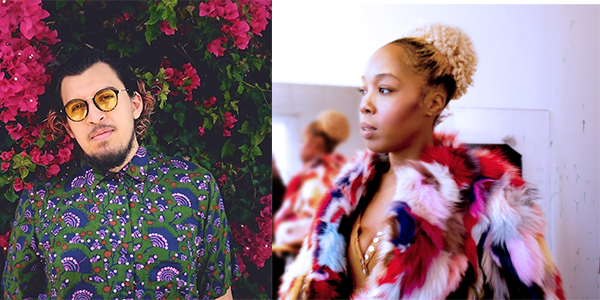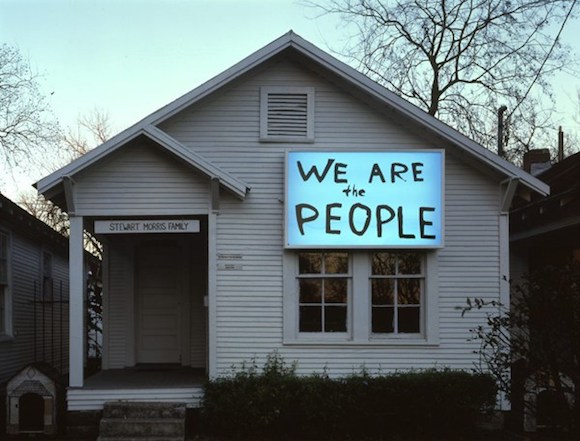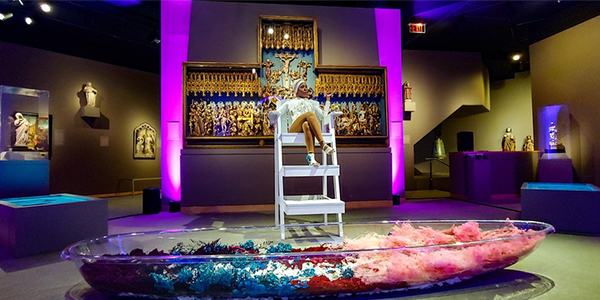
José Eduardo Sánchez, left, and Nicoletta Darita de la Brown.
Project Row Houses (PRH) and the Center for Art & Social Engagement (CASE) at the University of Houston’s Kathrine G. McGovern College of the Arts (KGMCA) in Houston have announced that Maryland-based Nicoletta Darita de la Brown and Texas-based José Eduardo Sánchez are the 2020 KGMCA-PRH Fellows. The review panel for the 2020 applications was made up of Michelle White, Senior Curator at the Menil Collection; Rachel Afi Quinn, Assistant Professor in Comparative Cultural Studies at the University of Houston; and 2017 KGMCA-PRH Fellow Carrie Schneider .
The KGMCA-PRH Fellowship is a year-long initiative that pairs artists and cultural practitioners with urban planners, educators, and policy makers to engage with Houston’s Third Ward community in creative collaboration.
Project administrators Ryan N. Dennis, PRH’s Curator and Programs Director, and Sixto Wagan, director of CASE, will mentor Sánchez and de la Brown, with support from the community, including local artists.

Project Row Houses.
“We are excited to welcome Nicoletta and José as the 2020 participating fellows,” says Dennis. “This program is instrumental in uplifting and showcasing artists like these two who tackle societal and cultural concerns in Houston’s Third Ward. Our organizations are honored to support their work towards building a sustainable community through art.”
There will be lectures and performances from Sánchez and de la Brown at introductory talks to be held on Tuesday, January 28, at 6:30 pm at the University of Houston’s Dudley Hall (4188 Elgin Street). The artists will share how they’ll approach their fellowships.

“Banera de Flora” was a one-woman installation at The Walters Art Museum by multidimensional artist Nicoletta Darita de la Brown. (Photo credit: Victor Rei Brown)
Spirit / Art, a project by de la Brown, “investigates divine feminine self-healing through reconstruction and re-definition with the use of video, sound, poetry, performance art, and immersive sculptural installation as creative tools.” De la Brown will conduct workshops and salons using the prompt: “When do we care for ourselves?”
Sánchez, a cultural organizer, educator, and language worker, will “consider the implications and ramifications of creative placemaking,” and ask us: “Whose social practices get to count as Art?” and “Who gets to have a place – both figuratively and literally – in Place-making?”
States Wagan: “We’re excited at how the Fellowships are becoming a significant instrument for positive change in our communities and in the careers of our Fellows. The 2020 Fellows and their research interests are timely explorations in how to care for and sustain our communities and our caregivers.”
****
Here are the Fellows’ bios:
Nicoletta de la Brown is a Maryland-based performance artist, interdisciplinary fabricator, filmmaker, mother of four, and self-love champion. Nicoletta is a Black Latinx and proud first-generation Panamanian born in the United States. She is a chamána (shaman) and comes from a long line of healers. Her work reconceives the life of an artist as thriving, nourishing herself and others during and through her creative practice. Nicoletta is also an adjunct faculty in the MFA in Community Arts Graduate Program at Maryland Institute College of Art (MICA), former Visual Art Department faculty member at Baltimore School for the Arts and is the Maryland Citizens for the Arts (MCA) Artist Navigator. As the Founder of Vida Mágica Love, a creative platform dedicated to healing-centered services, she produces audience participatory engagements through interactive workshops, immersive activations, and multi-sensory experiences.
Texas-based José Eduardo Sánchez is a queer, immigrant cultural organizer, language worker, and popular educator. His artistic vision challenges neoliberal individualization and the white spatial imaginary by conjuring the self-determination, resilience, and solidarity of marginalized peoples. He does this by creating invitations for communities in struggle to experience the alchemy of food, language, memory, and other forms of life-making as a way to prefigure and actualize collective healing, justice, and liberation. José Eduardo has a B.S. in political science and is a former Greensboro Justice Fund Fellow at the Highlander Center (2012) and Mickey Leland Fellow at the U.S. House of Representatives (2010). His artistic practice is informed by more than ten years of struggle as part of the transnational labor and immigrant justice movements, as well as his roots in Central Mexico and his experience as an immigrant in the U.S. José Eduardo lives in Houston’s North Side and currently organizes in community with La Unidad11 Houston, Familia TQLM, OLTT, and Antena Houston.


